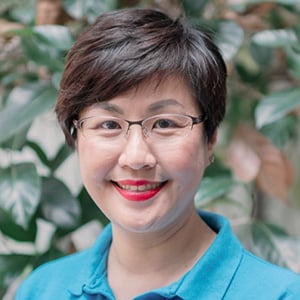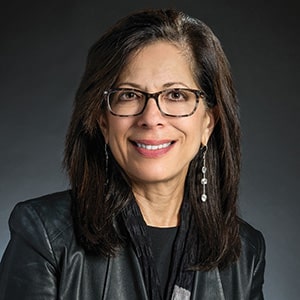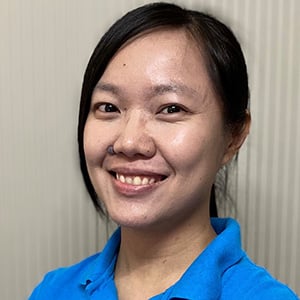Annie Chai, PhD, of Cancer Research Malaysia, remembers the moment in 2023 when she first heard that the American Association for Cancer Research (AACR) was launching the first in-person AACR on Campus event to offer education and training to early-career researchers in low-resource settings. It was just before the program was set to kick off in India, but she was already dreaming of the possibility of one day seeing AACR on Campus in her neighborhood.
“Whenever I see pictures from the AACR Annual Meeting of that touching moment where researchers place a pin on that big map to show where they are from, I’m always glad to see some representation from Malaysia,” Chai explained. “But there are so many early-career researchers in our country who can’t attend but could benefit from the training, networking, and educational opportunities that AACR offers.”
As early-career researchers who have gotten to experience these benefits firsthand as recipients of the AACR Global Scholar-in-Training Award (GSITA), Chai and her Cancer Research Malaysia colleague Li-Fang Yeo, PhD, have driven the efforts to bring AACR on Campus to Malaysia so that others can have the opportunity to interact with world-class cancer researchers.
Now, that dream is coming to fruition as the AACR is partnering with Cancer Research Malaysia to host AACR on Campus in Malaysia events in both Kuala Lumpur (November 10-11) and Kuching, Sarawak (November 13-14).
What Science Will Be Discussed?
Each AACR on Campus program is tailored to best serve the researchers and clinicians in that region. Sok Ching Cheong, PhD, of Cancer Research Malaysia and the chair of the organizing committee for the AACR on Campus Malaysia events, said each topic was chosen because they represent areas of cancer research that experts in Malaysia have been championing.
Both events will focus on four main topics with talks from prominent international researchers in those fields:
- Immunotherapy, featuring a talk from Elizabeth Jaffee, MD, FAACR, of the Sidney Kimmel Comprehensive Cancer Center at Johns Hopkins University
- Cancer Genomics, featuring a talk from Paul Boutros, PhD, MBA, of the David Geffen School of Medicine at UCLA
- Early Detection, Prevention, Screening, and Implementation, featuring a talk from Electra D. Paskett, PhD, MSPH, FAACR, of The Ohio State University
- Clinical Trials, featuring a talk from Timothy A. Yap, MBBS, PhD, of The University of Texas MD Anderson Cancer Center

In addition to the international speakers, each session will be chaired by a local researcher who will help guide the discussion around issues relevant to those in the region.
“Often, when researchers from our country attend the AACR Annual Meeting they are initially incredibly inspired by the wonderful talks and then quickly demotivated because the kind of work being done is often beyond the resources we have,” Cheong explained. “So, the local researchers will be working with our international speakers to help them understand the local scene so they can spark new ideas while explaining how to make it affordable in our region.”
For example, Jaffee, an AACR Past President and chair of the AACR’s Global Affairs Committee, has been speaking with Malaysian researchers to better understand what areas of immunotherapy most interest them as she prepares for her session.
“My talk will be about the current successes of immunotherapy, the next generation of immune checkpoint therapy that are showing promise, and our recent approach to using cancer vaccines to intercept the development of oncogene-associated cancers,” Jaffee explained.
In another session, the four international speakers will join local clinicians, a patient advocate, and a public health expert in Kuching and Kuala Lumpur for a panel discussion on how to address cancer disparities. As Cheong explained, it doesn’t matter if you have groundbreaking science if it doesn’t get to the people who could benefit from it, which is why implementation science will also serve as core area of focus for the meeting.
Networking Opportunities and Soft Skills Development
Chai, who is one of the co-vice chairs for the event, emphasized that the meeting isn’t just a chance to hear these amazing scientists talk, but to have an opportunity to engage with them.

“During the poster sessions or networking sessions, we want to encourage early-career researchers to pick the brains of these speakers about how they can improve their projects or even figure out ways to collaborate,” Chai said. “We want them to come away from this meeting feeling inspired, motivated, and empowered.”
Jaffee said the speakers feel similarly and she hopes the intimate environment of the meeting allows them to “form longer-term relationships to further the careers of young researchers.”
They also want attendees to come away with sharper soft skills that could aid them in other ways outside of their research itself. The second day of each meeting will feature workshops with Lisa Situ, PhD, assistant editor of the AACR journal Cancer Discovery, who will provide insights into scholarly publishing, and Yixian (John) Zhang, PhD, vice president of research and grants administration at the AACR, who will offer tips for grant writing and the application process.
“This is a very rare chance for scientists in Malaysia to listen to the editors from a prestigious journal like Cancer Discovery and get first-hand information about grants and other opportunities that are being offered by the AACR,” Chai said. “A lot of conferences don’t have these soft skills components, which are essential for the professional career development of early-career researchers.”
Including the Government’s Perspective
Another highlight of each meeting is a special guest of honor who will deliver an opening speech. In Kuching, that will be Sim Kui Hian, MBBS, the deputy premier of Sarawak and the minister of public health, housing, and local government of Sarawak.

“Sim is a clinician himself and one of the key leaders of the state’s health transformation who has shown a strong commitment to advancing health care and supporting cancer research initiatives,” Cheong explained. “He will be giving a message about how important it is to have advancements, discovery, and evidence-based ways of shaping public health.”
With policymakers, researchers who span the cancer continuum, and experts in key skills related to professional development, Chai said that the AACR on Campus in Malaysia events offer something different from anything else researchers in the region can attend.
“Most conferences in Malaysia are very research-centric and often only focus on certain cancers,” Chai explained. “The great thing about the format of AACR on Campus is it bridges the translational gap between preclinical, clinical, and implementation studies, so we are offering something for everyone who is passionate about advancing cancer research and helping the patient community.”
This conference is open to all cancer researchers, with a particular focus on early-career cancer researchers (less than 10 years after terminal degree) from universities and research institutions from countries with emerging economies. To extend the benefit and impact of the conference to neighboring countries in the region, international participants from the region are also welcome. The registration deadline for both AACR on Campus Malaysia in Kuala Lumpur and AACR on Campus Malaysia in Kuching, Sarawak is August 31.

